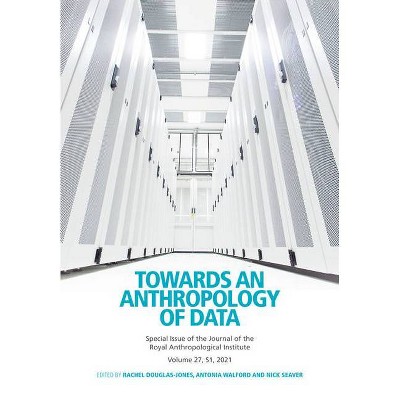Towards an Anthropology of Data - (Journal of the Royal Anthropological Institute Special Issue) (Paperback)

Similar Products
Products of same category from the store
AllProduct info
<p/><br></br><p><b> About the Book </b></p></br></br>"Data is everywhere. While 'big' data may have once seemed limited to business or high tech, ethnographers are now finding data -- and its attendant values and practices -- in their field sites around the world. Data has motivated a sweep of dystopian visions, signaling the invasion of privacy, political manipulation, or shadowy data doubles. Yet anthropologists have been cautious in taking data itself as an object of theoretical interest, even as the effects of data become manifest in our ethnographies. This volume presents a set of theoretically inventive pieces that engage with data across its many locations, from government databases to ecological field stations, from kitchen tables to concrete bunkers. The contributors demonstrate how thinking with data can be conceptually generative for anthropology, prompting us to reconsider our understanding of topics including bodies, persons, and the social itself. 'Data' is a notoriously slippery concept, often signaling claims to remote objectivity and universality; by putting data in its place, the pieces collected here develop conceptual tools that will prove useful for anthropologists who find 'data' in their data"--<p/><br></br><p><b> Book Synopsis </b></p></br></br>This volume presents a set of theoretically inventive pieces that engage with data across its many locations, from government databases to ecological field stations, from kitchen tables to concrete bunkers.<br /><br /> <ul> <li>Contributors demonstrate how thinking with data can be conceptually generative for anthropology, prompting us to reconsider our understanding of topics including bodies, persons, and the social itself</li> <li>Shows how 'big' data which may have once seemed limited to business or high tech, ethnographers are now finding data - and its attendant values and practices - in their field sites around the world</li> <li>Examines how data has motivated a sweep of dystopian visions, signaling the invasion of privacy, political manipulation, or shadowy data doubles</li> <li>Discusses how anthropologists have been cautious in taking data itself as an object of theoretical interest, even as the effects of data become manifest in our ethnographies</li> <li>By putting data in its place, the chapters collected here develop conceptual tools that will prove useful for anthropologists who find 'data' in their data</li> </ul><p/><br></br><p><b> From the Back Cover </b></p></br></br><p>Data is everywhere. While 'big' data may have once seemed limited to business or high tech, ethnographers are now finding data - and its attendant values and practices - in their field sites around the world. Data has motivated a sweep of dystopian visions, signaling the invasion of privacy, political manipulation, or shadowy data doubles. Yet anthropologists have been cautious in taking data itself as an object of theoretical interest, even as the effects of data become manifest in our ethnographies. This volume presents a set of theoretically inventive pieces that engage with data across its many locations, from government databases to ecological field stations, from kitchen tables to concrete bunkers. The contributors demonstrate how thinking with data can be conceptually generative for anthropology, prompting us to reconsider our understanding of topics including bodies, persons, and the social itself. 'Data' is a notoriously slippery concept, often signaling claims to remote objectivity and universality; by putting data in its place, the pieces collected here develop conceptual tools that will prove useful for anthropologists who find 'data' in their data.</p><p/><br></br><p><b> About the Author </b></p></br></br><b>Rachel Douglas-Jones</b> is Associate Professor of Anthropological Approaches to Data and Infrastructure at the IT University of Copenhagen, where she is Head of the Technologies in Practice research group and co-Director of the ETHOS Lab. Her research interests centre on evaluative knowledge practices and technologies of governance, including ethics committees, digital bureaucracies, technological substitution and augmentation, data erasure and most recently, the ethics of inference. She is the editor (with Bob Simpson) of <i>New Immortalities </i>and editor (with Justin Shaffner) of <i>Hope and Insufficiency: Capacity Building in Ethnographic Comparison.<br /><br /></i><b>Antonia Walford</b> is Lecturer in Digital Anthropology at University College London. Their research explores the effects of digital data and datafication on social, cultural and political imaginaries and practices, with ethnographic focus on the environmental sciences and the Brazilian Amazon. They are the co-editor of <i>A World Laid Waste? Responding to the Social, Cultural and Political Consequences of Globalisation; Lineages and Advancements in Material Culture Studies: perspectives from UCL Anthropology </i>and <i>Environmental Alterities </i>(forthcoming).<br /><br /><b>Nick Seaver</b> is Assistant Professor of Anthropology at Tufts University, where he teaches in the Science, Technology, and Society program. He studies how technologists make sense of cultural concerns like taste and attention, conducting ethnographic fieldwork with programmers, computer scientists, and entrepreneurs in the United States. His work has been published in journals including <i>Big Data & Society</i>, <i>Cultural Anthropology</i>, and the <i>Journal of Material Culture</i>.
Price History
Price Archive shows prices from various stores, lets you see history and find the cheapest. There is no actual sale on the website. For all support, inquiry and suggestion messagescommunication@pricearchive.us




















